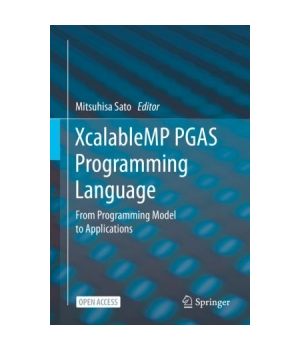XcalableMP PGAS Programming Language
XcalableMP is a directive-based parallel programming language based on Fortran and C, supporting a Partitioned Global Address Space (PGAS) model for distributed memory parallel systems. This open book presents XcalableMP language from its programming model and basic concept to the experience and performance of applications described in XcalableMP.? XcalableMP was taken as a parallel programming language project in the FLAGSHIP 2020 project, which was to develop the Japanese flagship supercomputer, Fugaku, for improving the productivity of parallel programing. XcalableMP is now available on Fugaku and its performance is enhanced by the Fugaku interconnect, Tofu-D. The global-view programming model of XcalableMP, inherited from High-Performance Fortran (HPF), provides an easy and useful solution to parallelize data-parallel programs with directives for distributed global array and work distribution and shadow communication. The local-view programming adopts coarray notation from Coarray Fortran (CAF) to describe explicit communication in a PGAS model. The language specification was designed and proposed by the XcalableMP Specification Working Group organized in the PC Consortium, Japan. The Omni XcalableMP compiler is a production-level reference implementation of XcalableMP compiler for C and Fortran 2008, developed by RIKEN CCS and the University of Tsukuba. The performance of the XcalableMP program was used in the Fugaku as well as the K computer. A performance study showed that XcalableMP enables a scalable performance comparable to the message passing interface (MPI) version with a clean and easy-to-understand programming style requiring little effort.
| Pages : | 265 |
| Size : | |
| File type : | HTML |
| Downloads: | 291 |
| Created: | 2021-05-15 |
| License: | Free |
| Author(s): | Mitsuhisa Sato |

Warning: Trying to access array offset on false in /home/tutovnfz/public_html/article.php on line 233
Others XcalableMP PGAS Tutorials
Others related eBooks about XcalableMP PGAS Programming Language
Fundamentals of Python ProgrammingThis book does not attempt to cover all the facets of the Python programming language. Exp..., download free Python tutorial in PDF (669 pages) created by ....
C++ Notes for ProfessionalsDownload free course C++ Notes for Professionals, pdf file on 707 pages by Stack Overflow Community....
Graph AlgorithmsDownload free course Graph Algorithms, pdf file on 257 pages by Mark Needham, Amy Hodler....
A Practical Introduction to Python ProgrammingThis book is for anyone who wants to understand Python programming. It is degigned as partly a tutorial and partly a reference of Python....
Word 2010 advanced part 1Advanced tutorial about Microsoft Word 2010, download free course for beginners in PDF....
Flutter in ActionWith Flutter, you can build mobile applications using a single, feature-rich SDK that includes everything from a rendering engine to a testing environment. Flutter compiles programs written in Google’s intuitive Dart language to platform-specific code so your iOS and Android games, utilities, and ...
Fundamentals of Python ProgrammingDownload free course Fundamentals of Python Programming, pdf file on 669 pages by Richard L. Halterman....
AlgorithmsAlgorithms are the lifeblood of computer science. They are the machines that proofs build ..., download free Algorithms tutorial in PDF (472 pages) created by Jeff Erickson ....
An Introduction to C & GUI ProgrammingDownload free course An Introduction to C & GUI Programming, pdf file on 156 pages by by Simon Long....
Learn Node.JSThis beginner's course of Node.js will teach you how to make a first functional Web application using Node.js. The author presents his work as the guide he would have liked to read starting with Node.js. He has deliberately simplified his explanations so as to be comprehensible to the greatest numbe...